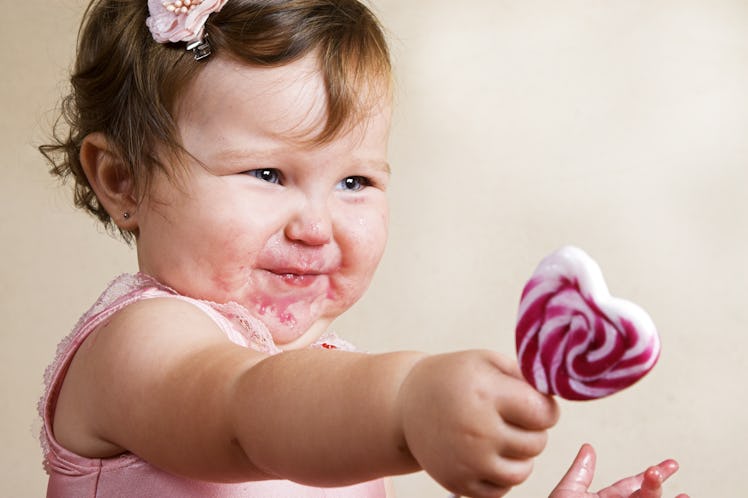5 Reasons To Let Kids Buy Presents, According To Child Psychologists
Even if it’s with your own money.

When I would ask my dad what he wanted for Christmas as a kid, he would say the same thing every year: “I have a job, so I can buy whatever I want for myself.” But even when fathers can tell exactly what they’re getting for Hanukkah, Christmas, or a birthday (because the purchase shows up on their credit card statements), early childhood experts have found that you should let your kid give you gifts anyway, mostly because it’s not about you. Rather, learning how to give gifts can teach kids how to share and take turns.
“Young children continue to have a sense of entitlement, which is developmentally appropriate,” says psychotherapist Sharnell Myles, Psy.D. “Consequently, it can be difficult for them to understand that just because they are given presents, it doesn’t mean that all presents are their’s.” When young kids participate in gift-giving, “they are learning to share, to consider others, how to be cooperative and take turns — and ultimately, they are taught empathy.”
Erin O’Connor, the director of New York University's Early Childhood Education program, agrees that “gift-giving can play a significant role in a child’s developmental journey.”
Here, Myles and O’Connor share five reasons why gift-giving can help kids become better people.
1. Gift-Giving Helps With Cognition
Giving presents is good for a child’s growing brain because it makes them use it. Or, as O’Connor put it, “It requires children to flex their critical thinking skills by having to think through the infinite gift options and choose one that makes the most sense to the recipient.”
It's worth noting that children don’t develop the ability to see someone else’s point of view until they’re around age 4, a concept experts refer to as “theory of mind.” As much as gift-giving is good for development, if it’s rushed, “it may increase a child's temper tantrums,” Myles warns.
Still, if parents want to start introducing their children to the concept of giving presents early, like around 18 months old, having them draw a picture for someone “can be a great way to ease into it,” O’Connor says.
2. Giving Presents Encourages Communication
Gift-giving can be a great opportunity to have a conversation and connect with kids. “Young children, ages 5 or 6, may oftentimes give a gift or a toy that they would actually want for themselves,” Myles explains. That’s why when her son is brainstorming gifts for his friends, she asks him questions about what his friend likes, compared to his own interests. In a subtle way, she’s teaching him to go through this thought process on his own by greasing the wheels a bit. In these discussions, she also manages any expectations that her son will receive a gift in return.
Outside of conversations about what to buy, the act of giving a present in itself models non-verbal communication for children in several ways. For one, there is the act of “symbolically communicating their love through the gift,” O’Connor says. On top of that, “the recipient’s facial expression will help the child learn non-verbal cues.”
3. Gift-Giving Is a Sensory Experience
Plaster handprints are not just an inexpensive gift kids can make for their parents; DIY or handmade gifts are a great way to engage a child’s motor skills. According to the Cleveland Clinic, sensory play also helps children to build up better problem-solving skills and more self-awareness of their bodies, including how they affect objects in their environments.
If children are purchasing presents rather than making them, they can still practice motor skills by gift-wrapping, O’Connor says. And as a bonus, they get to do their favorite activity in the process: make a mess.
4. Giving Presents Encourages Creativity
The American Psychological Association defines creativity as “the ability to produce or develop original work, theories, techniques, or thoughts,” adding that a creative person “typically displays originality, imagination, and expressiveness.” Creativity has been linked with everything from improved well-being to career success later in life.
Children are perceived to be more creative than adults, partially because they’re less affected by thought patterns and judgments adults develop over time. Gift-giving allows them to flex that muscle. “Coming up with a thoughtful gift requires creativity, and this can be further practiced through a handmade gift,” O’Connor says.
In other words, it gives kids a chance to think outside the gift box.
5. Giving Gifts Increases Emotional Intelligence
Perhaps most importantly, letting your kid give you presents teaches essential emotional skills like empathy and and gratitude. “Children start to understand their place in social relationships and develop a sense of thoughtfulness,” O’Connor explains. “This helps them understand different perspectives and fosters a sense of identity as a caring individual.” That’s a pretty good deal for a price-point of $30, even if it’s your own cash going toward something you don’t really want.
Although it’s entirely possible that gift-giving can teach your child how to become a better recipient by seeing the other side, Myles cautions against putting this expectation on kids. “If a parent is going to teach their child to give gifts, let that be it.”